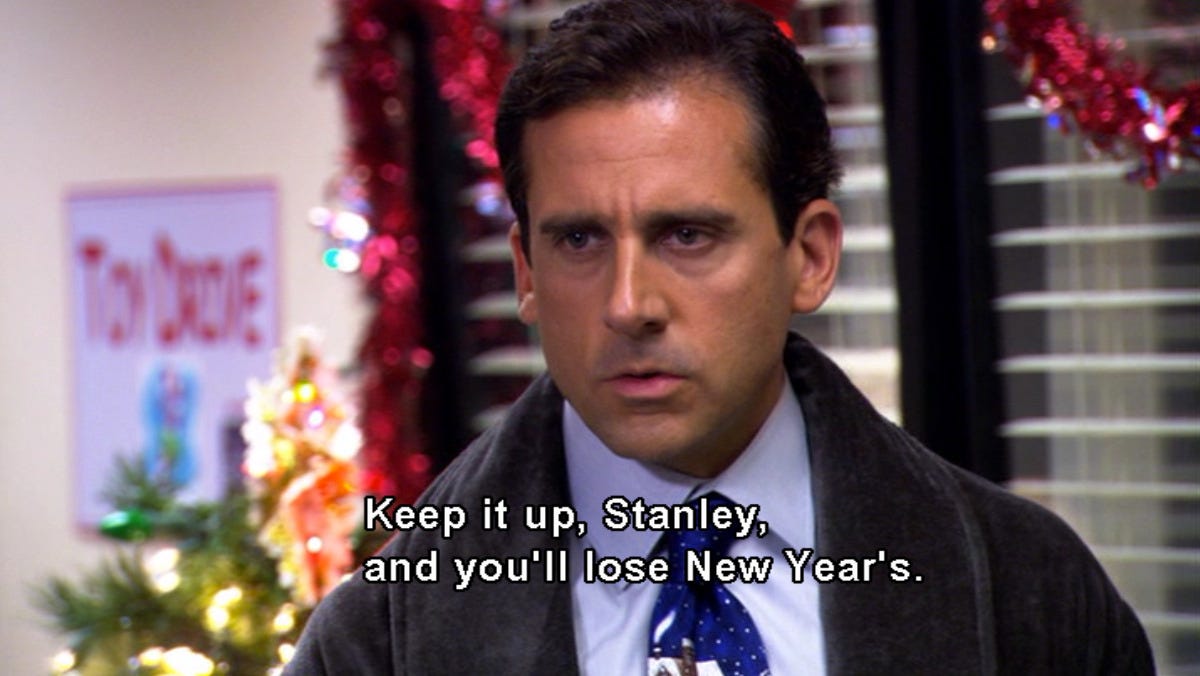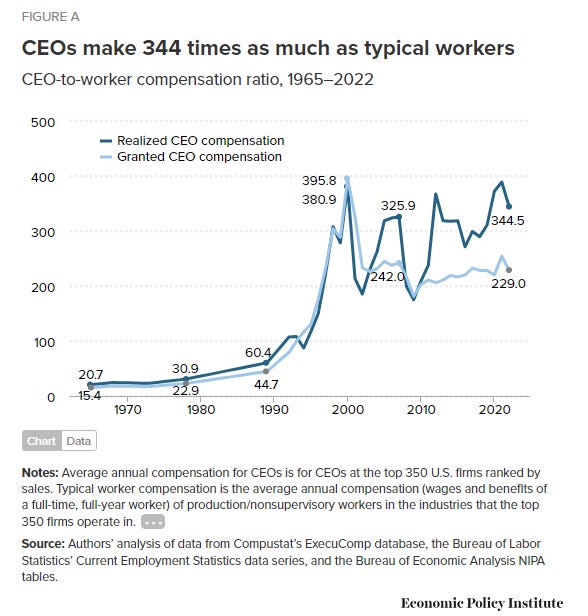RTO Mandates Are Becoming Imbalanced
Starbucks's CEO swap highlights a nagging problem when it comes to in-office mandates.
Last week news broke for those who are fans of over-roasted coffee beans: the Starbucks board had been secretly working on a CEO swap to replace Laxman Narasimham with Chipotle CEO Brian Niccol. You remember Niccol from when he helped to turn Chipotle around after their disastrous 2018 when E. Coli had replaced burritos as their main offering.
As more and more details came out, the story started to take on mythological proportions. Niccol had been cold-called by the board and the entire process was done with the utmost secrecy. Narasimham only learned of his ousting three days before the public. Niccol will be paid handsomely for the switch - at 9 figures the package is quite attractive. One thing that won’t be part of it is a relocation budget; Niccol will be a remote employee.
Rules for Thee, Not for Me
Niccol certainly isn’t the only CEO working remotely, but he’s currently the most high-profile (and likely highest paid) CEO working remotely. For Starbucks rank and file in the Seattle office, the appointment and working arrangement could very well be rubbing salt in the old RTO wound.

In September of 2022, Starbucks was among the myriad corporate entities demanding their people come into the office. For ‘Buckers (is that what they call themselves? I just made it up) the mandate was twice a week.
But on-again CEO Howard Schulz felt that the employees working for him weren’t making the effort he expected and after concluding that swipes into the Starbucks offices were too low, he upped the mandate to three days a week (no word on if he ended the announcement with “Keep it up and I’ll make it 5, buddy boy.”)
The reasons Schultz cited for the 50% increase in on-site days included “rebuilding connections to each other” and “synchronizing teams and efforts.” Which makes the decision to allow Niccol to work remotely (from the same coast, natch) all the more bewildering. If in-office attendance for at least 60% of the work week is required for connection and synchronization, how can a CEO effectively connect and synchronize with his management team - never mind the lifeblood of the organization in the employees - at 0% of the work week?
WFH is Incompatible with Late Stage Capitalism
Since RTO mandates came down post-pandemic, a burgeoning RTO caste system has begun to emerge. In the agency world, promotions were held back to those flouting the three-day mandate put in place across the major holdcos. In other words, careers were held back not from productivity or skillset issues, but based on where someone physically sat doing their work.
Through the lens of the research that RTO mandates do not influence productivity one way or the other, that is a particularly jarring reality for a workforce that adapted as well as they did to a Covid world where they continued to toil while wondering what fresh hell they were going to wake up to the next day.
And there’s a reason for this: again, it’s not productivity or business outcomes. It’s that the entire late-stage capitalistic system is built off of people commuting into commercial real estate held by huge institutions, buying $20 lunches from VC-funded companies that don’t actually make money, and contributing to mass transit just enough for governments to skip out on actually funding them at a sustainable level.
Business leaders have begun saying the quiet part out loud. Ex-Googler Eric Schmidt, who recently opined on why Google was behind in the AI space, said that “Google decided that work-life balance and going home early and working from home was more important than winning.”
The message to employees is clear: leadership at these companies does not care about your well being. They only care about how much productivity they can squeeze out of you without you leaving the firm. I personally would also argue that making George Washington black might have been worse for Google’s AI roadmap than WFH policies, but that’s simply one guy’s opinion.
A Burgeoning RTO Caste System?
It remains to be seen with certainty today, but the trend of leadership not being held to the same RTO mandates as the employees they manage could very well lead to a system resembling castes when it comes to who needs to be in office versus for whom the mandate is merely a suggestion.
And I think that there is an aspect where older leaders are simply out of touch with younger generations. We know they don’t talk to younger generations, but the idea that leaders could be insanely out of touch hit home for me when RTO mandates came out at the holdco I was employed by at the time.
When RTO mandates started hitting agencies, a leader at a large holdco attempted to make a “We’re all in this together” speech by explaining that yeah, they moved their family out of the city during Covid, but they had recently been commuting into the city for three days a week after buying a pied-a-terre in one of the most expensive cities in their country to do it. So at the end of the day, everyone is making sacrifices.
Now, I’m a big Occam’s Razor fan, so when I heard about this I ascribed it not to a malicious “Screw you little people” mentality - that explanation requires too many leaps to get to an explanation. The simpler reasoning is that a lot of these leaders simply don’t get it. They are paid sums that are monstrous in comparison to junior salaries up against one of the biggest cost of living crises in decades.
The reality in these companies is that the executives are paid an obscene amount when compared to the average employee. And this is a new trend: this kind of pay inequality is less than a generation old. CEO pay has increased over 1200% since 1978. The average employee? A paltry 15%.
So I’m not sure Eric Schmidt has his eye on the ball here, nor the Starbucks board. If they want to turn around flagging results in their corporations, it might make sense to pay attention to the juniors - you know, the ones actually doing the work - than denigrating them by mocking their desire for “work-life balance” or paying out wild sums of money to a remote CEO. Otherwise we are simply heading to a system where the cultural (and economic) gap between junior and senior employees only grows, which will make it all the more difficult to actually lead and run a functioning corporation.
Grab Bag Sections
WTF Slow Walkers: I’m a quick walker - my height, combined with my anxious desire to get where I’m going, combine to create an efficient walking style to get from point A to point B. Lately, however, I have noticed that my fellow New Yorkers are beginning to lose a couple MPH off of their walking pace.
It used to be NYC was a safe space for quick walking: the residents knew what was up and hustled accordingly. It’s the city that never sleeps, and everyone has places to be. Sure, you’d run into some tourist here or there who had no idea what was going on but as long as you avoided midtown west and the ESB area you were good.
No more: NYCers are slowing down and I cannot figure out why. With so little control left in the average person’s life, you’d think one’s walking speed - in which each person has consummate control - would be a priority. I get it, it must be nice to have nowhere to be, but don’t punish the rest of us trying to get somewhere on time. Pick up the pace, New York.
Album of the Week: In keeping our eye on New York, let’s head down to the planet and spin an absolutely classic vinyl that happens to be the same color on side A and B. It’s Mos Def’s Black on Both Sides this week. And it’s one of the best debut studio albums to have ever been recorded.
The lead single off of the album was “Ms. Fat Booty,” which has an intro you cannot help but nod your head to, as Mos Def comes in and proves himself to be one of the best storytellers in rap. It also will hit home to those of us who can’t rely on our looks as much as we’d like: “Conversating, made her laugh, yeah you know me bro.”
“Hip Hop” is one of the best songs about the industry to be put on wax. The features from fellow Brooklynites (“Do It Now” with Busta Rhymes and “Know That” with Talib Kweli) are highlights of the album.
But the best track is Mos Def’s three-part ode to New York’s largest borough in “Brooklyn.” It has peerless replay-ability and showcases Mos Def’s innate rhyming skills.
Even if the Murdoch family gets money from streaming it, you have to listen to this album. The late 90s/early 00s were a golden age of East Coast hip hop and Mos Def’s contribution to it was outsized in the form of Black on Both Sides.
Quote of the Week: “Ask for work. If they don't give you work, ask for bread. If they do not give you work or bread, then take bread.” - Emma Goldman
See you next week!








